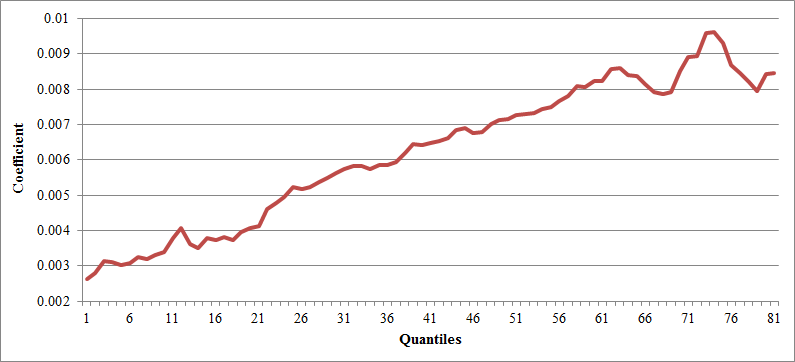The Internet may boost private sector development in developing and emerging countries by improving access to market information, by facilitating more effective coordination of firms’ production and delivery chains and by creating new business opportunities. However, impacts on firm performance may not be equally strong across regions of the world, and differ with countries’ development status. A potential reason for weaker impacts is cumbersome framework conditions - shortcomings in physical infrastructures, weakly developed financial markets, and an often insufficiently skilled labor force. Such shortcomings have hindered private sector development initiatives in the past and may also need to be addressed before the Internet can support firm performance.
A recent paper by us addresses how widespread the gains from industries’ Internet adoption on the private sector are, and what effects cumbersome business framework conditions have. Evidence on 49,610 firms in 117 developing and emerging economies for the 2006-2011 period shows positive impacts of industries’ use of the Internet on firms‘ productivity and innovation performance, independently of firms’ own investment in Internet technology. We show that positive impacts of industries’ Internet adoption on firms’ labor productivity are widespread, improving firms’ efficiency in Africa, Eastern Europe, Central Asia, and the Middle East as well as Latin America and the Caribbean. Benefits arise for firms operating in economies at different development stages, including in low-income economies.
Moreover, we find that positive productivity gains are maintained even where business environments are cumbersome. Corruption and skills shortages are not reducing productivity gains from industries’ adoption of the Internet. While a weak electricity infrastructure as well as cumbersome financing and labor regulations lower the positive impact of the Internet, our evidence shows firms still have productivity improvements. In other words, the success of private sector development strategies that aim to foster industries’ Internet adoption is not completely contingent on solving difficult-to-address shortcomings.
However, gains differ across the productivity distribution with the most productive firms benefitting about three times more than their less productive counterparts (Figure 1). Only firms with higher levels of absorptive capacities gain from Internet-enabled knowledge spillovers. The least productive benefit little.
FIGURE 1. The Impact of Differential Productivity Performance on Returns to the Internet

Note: The dependent variable is labor productivity. The figure plots the coefficient of the
impact of Internet adoption of quantile regressions for each decile.
The existence of spillover effects from industries’ adoption of the Internet justify public policies aimed at fostering industries’ use of the Internet. However, differences in capabilities to use the knowledge obtained via the Internet could create a new “digital divide”. Only firms with adequate absorptive capabilities can benefit from business intelligence platforms and online exchange forums give access to knowledge relevant to their scientific and technological needs. Therefore, facilitating firms’ access to such networks and strengthening their capacities to use them deserves policy support.
The findings expressed are those of the authors and do not necessarily represent the views of the OECD or its member countries.
Related Links
Paunov, C., and V. Rollo. 2014. Has the Internet Fostered Inclusive Innovation in the Developing World? UNU-Merit Working Paper.
Paunov, C., and V. Rollo. 2015. Overcoming Obstacles: The Internet's Contribution to Firm Development. World Bank Economic Review, forthcoming.
A recent paper by us addresses how widespread the gains from industries’ Internet adoption on the private sector are, and what effects cumbersome business framework conditions have. Evidence on 49,610 firms in 117 developing and emerging economies for the 2006-2011 period shows positive impacts of industries’ use of the Internet on firms‘ productivity and innovation performance, independently of firms’ own investment in Internet technology. We show that positive impacts of industries’ Internet adoption on firms’ labor productivity are widespread, improving firms’ efficiency in Africa, Eastern Europe, Central Asia, and the Middle East as well as Latin America and the Caribbean. Benefits arise for firms operating in economies at different development stages, including in low-income economies.
Moreover, we find that positive productivity gains are maintained even where business environments are cumbersome. Corruption and skills shortages are not reducing productivity gains from industries’ adoption of the Internet. While a weak electricity infrastructure as well as cumbersome financing and labor regulations lower the positive impact of the Internet, our evidence shows firms still have productivity improvements. In other words, the success of private sector development strategies that aim to foster industries’ Internet adoption is not completely contingent on solving difficult-to-address shortcomings.
However, gains differ across the productivity distribution with the most productive firms benefitting about three times more than their less productive counterparts (Figure 1). Only firms with higher levels of absorptive capacities gain from Internet-enabled knowledge spillovers. The least productive benefit little.
FIGURE 1. The Impact of Differential Productivity Performance on Returns to the Internet

Note: The dependent variable is labor productivity. The figure plots the coefficient of the
impact of Internet adoption of quantile regressions for each decile.
The existence of spillover effects from industries’ adoption of the Internet justify public policies aimed at fostering industries’ use of the Internet. However, differences in capabilities to use the knowledge obtained via the Internet could create a new “digital divide”. Only firms with adequate absorptive capabilities can benefit from business intelligence platforms and online exchange forums give access to knowledge relevant to their scientific and technological needs. Therefore, facilitating firms’ access to such networks and strengthening their capacities to use them deserves policy support.
The findings expressed are those of the authors and do not necessarily represent the views of the OECD or its member countries.
Related Links
Paunov, C., and V. Rollo. 2014. Has the Internet Fostered Inclusive Innovation in the Developing World? UNU-Merit Working Paper.
Paunov, C., and V. Rollo. 2015. Overcoming Obstacles: The Internet's Contribution to Firm Development. World Bank Economic Review, forthcoming.



Join the Conversation